Shikari Devi Wildlife Sanctuary, nestled in Mandi, Himachal Pradesh, is a pristine haven of tranquility and rich biodiversity. The sanctuary’s serene environment, lush forests, and diverse flora and fauna make it a premier destination for nature enthusiasts and wildlife lovers alike. Visitors can explore scenic trails and observe a variety of wildlife in their natural habitat. The area is also known for its spectacular viewpoints, offering breathtaking panoramas of the surrounding mountains. Its stunning vistas and peaceful atmosphere provide an ideal retreat from urban life.
Location
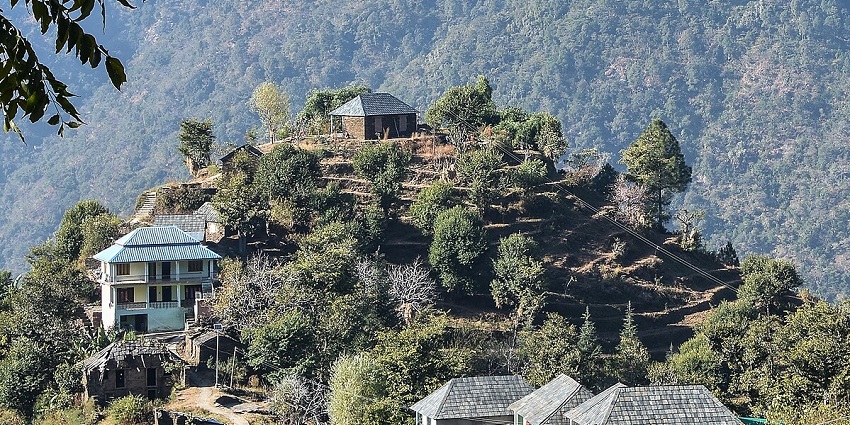
Photo: Timothy A. Gonsalves / Wikimedia Commons / Image For Representation Only
Shikari Devi Wildlife Sanctuary of Himachal Pradesh is located in the region of the Mandi District. It’s among the top wildlife sanctuaries in the state because of its breathtaking views and serene environs.
Suggested Read: Hill Stations In Himachal Pradesh Where You Can Get Lost In The Mountains
How To Reach Shikari Devi Wildlife Sanctuary
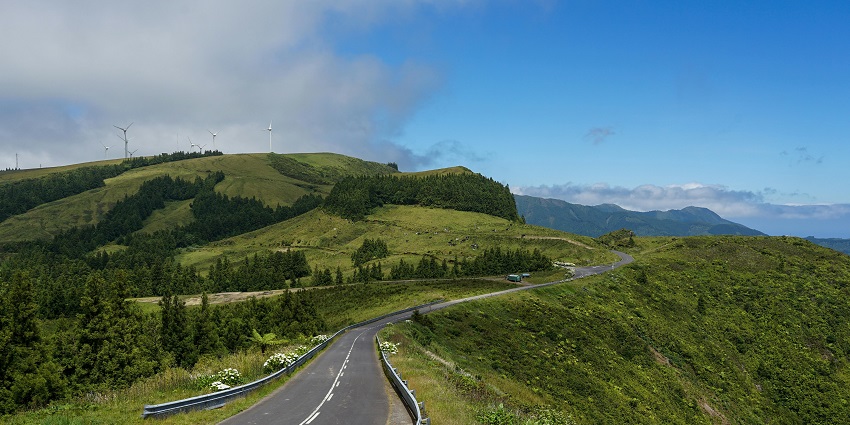
Photo: Alexandre Moreira / Pexels / Image For Representation Only
There are several ways to reach the Shikari Devi Wildlife Sanctuary:
By Air: The nearest airport is Bhuntar Airport, located about 50 kilometres from the sanctuary. Visitors can hire a taxi from the airport or take a local bus to reach the sanctuary.
By Road: The sanctuary is accessible from Mandi and other nearby towns. Regular bus services and shared taxis operate between these towns and the sanctuary. The journey through the picturesque landscape offers beautiful views of the surrounding hills.
By Train: The nearest central railway station is in Chandigarh, approximately 180 kilometres away. From Chandigarh, visitors can hire a taxi or bus to Mandi and proceed to the sanctuary.
Places In Shikari Devi Wildlife Sanctuary
Here are some key locations within and around the sanctuary:
1. Mandi
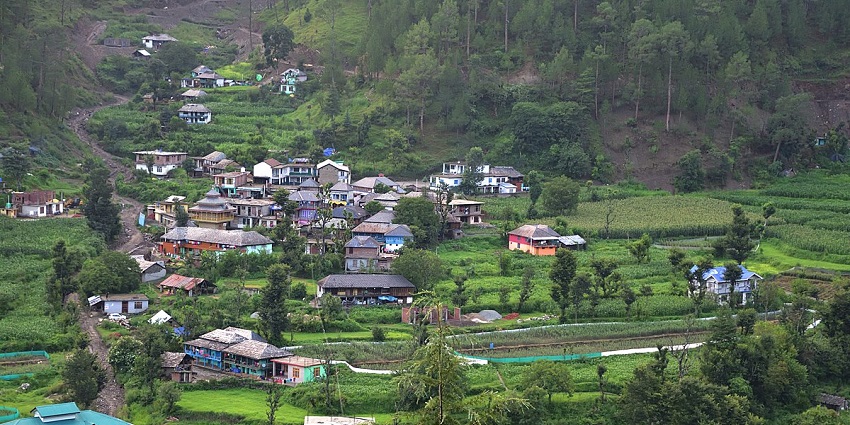
Photo: Timothy Gonsalves / Wikimedia Commons
Named the ‘Varanasi of the Hills,’ Mandi is an old town in the Himachal Pradesh district of Mandi. Situated on the banks of the Beas River, Mandi is a culturally diverse city with naturally stunning architecture. This town is home to more than 80 historic temples. The Bhutnath Temple and the Panchvaktra Temple are significant temples that draw a lot of pilgrims and visitors. Mandi’s bustling marketplaces entice tourists due to the allure of regional handicrafts, genuine Himachali textiles, and food items. The town’s magnificent colonial-era architecture can be seen at Mandi Palace as reminders of its regal past.
Best Time To Visti: March to June and September to November
Activities: Explore the ancient temples, visit the local markets, and enjoy scenic walks along the riverbanks
Suggested Read: Places To Visit Near Mandi On Your Next Vacation Amid Himalayas
2. Shikari Devi Temple
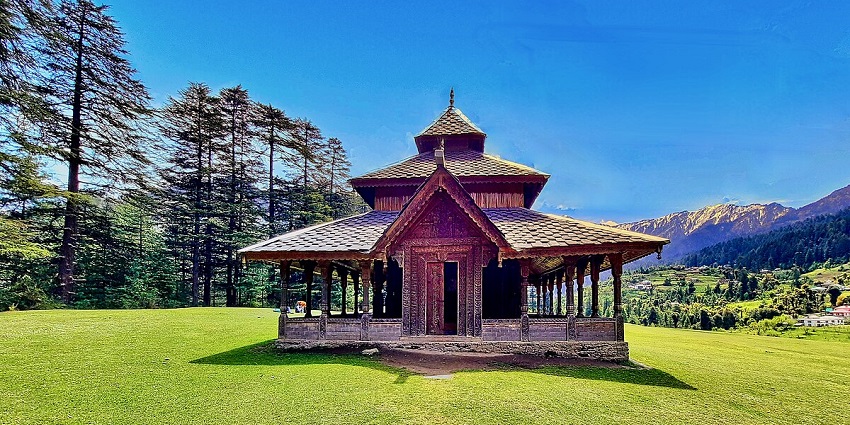
Photo: Ms Sarah Welch / Wikimedia Commons / Image For Representation Only
The Shikari Devi Temple is a historic shrine to the goddess Shikari Devi, perched at about 3,300 metres. The temple is in the Shikari Devi sanctuary, providing breathtaking 360-degree vistas of the Himalayas’ verdant valleys. It offers one of the most significant pilgrimage locations, drawing followers looking for spiritual comfort and blessings. One factor contributing to the temple’s serene atmosphere is its secluded location amid the never-ending walls of the untamed landscape. The temple still has the typical Himachali architectural style.
Timings: 24*7
Activities: Visit the temple for spiritual solace, enjoy the panoramic views, and engage in local rituals
3. Kangra Fort
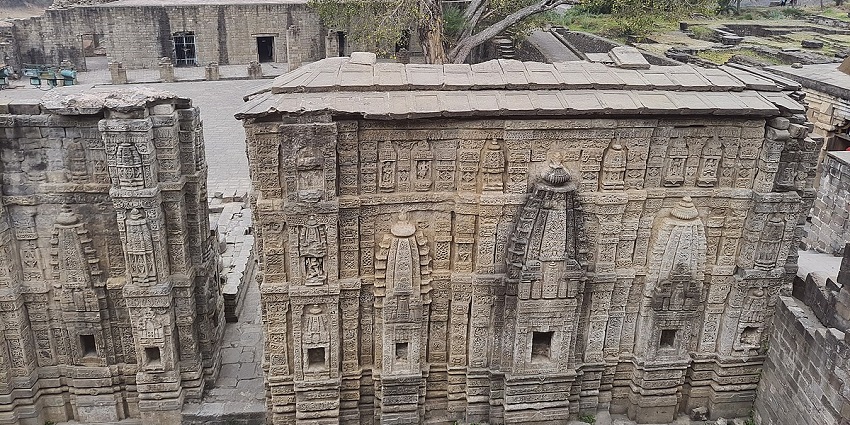
Photo: Ranaa0096 / Wikimedia Commons
Situated about 90 kilometres from Mandi, Kangra Fort is one of the largest and oldest forts in Himachal Pradesh. Its origins date back to the 4th century, making it a significant historical landmark. The fort is strategically perched on a hill, offering commanding views of the surrounding Kangra Valley. The fort complex includes ancient temples, including the Lakshmana Temple, and several gates with intricate carvings. The fort’s architecture reflects a blend of various dynasties that ruled the region.
Timings: 24*7
Activities: Explore the ancient fort’s historical structures, including its temples and gates. Learn about the fort’s rich history through exhibits at the on-site museum
Suggested Read: Best Hill Stations Near Palampur For Serene Escapes And Scenic Views
4. Palampur
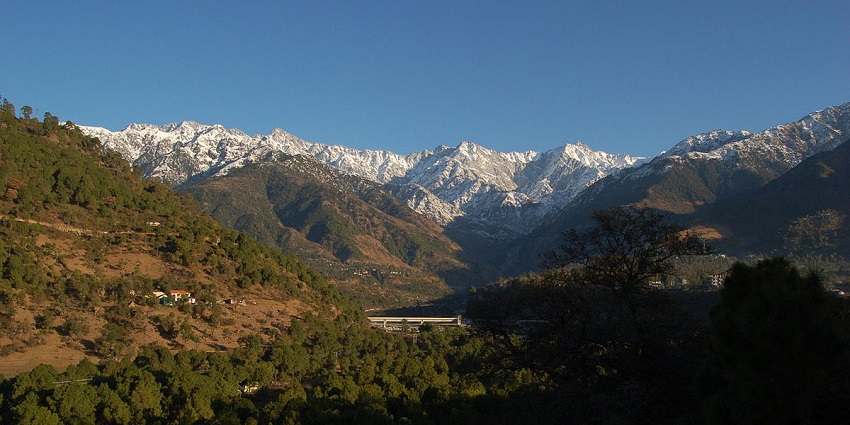
Photo: Sumeet Jain / Wikimedia Commons
Known as the “Tea Capital of North India,” Palampur is located around 35 miles from Mandi. Palampur is known for its evergreen tea gardens, where visitors can take guided tours and learn how the tea is made there. The Baijnath Temple of Lord Shiva and the lovely Saurabh Van Vihar Park, great for picnics and nature hikes, are further points of interest in Palampur. Many tourists visiting the area for various leisure activities are drawn in by the town’s pleasant climate and alluring beauty.
Timings: March to June and September to November
Activities: Tour the scenic tea gardens and learn about the production process. Visit the Baijnath Temple and enjoy the tranquil surroundings of Saurabh Van Vihar
5. Bir Billing
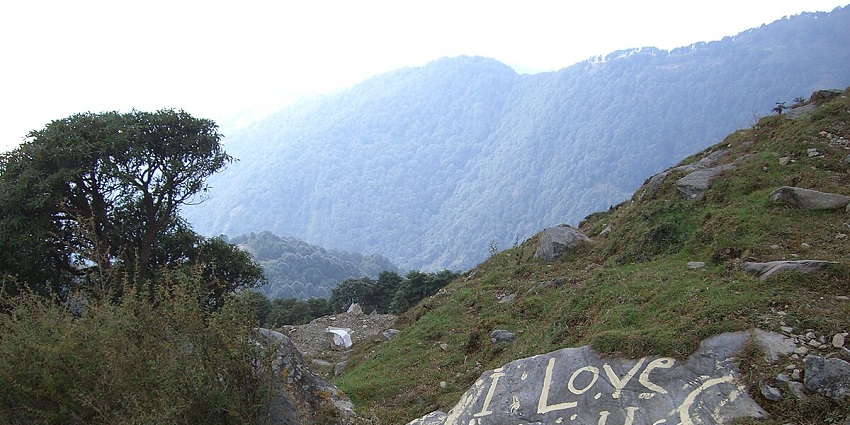
Photo: Okorok / Wikimedia Commons
Bir is a typical lively Tibetan village that offers a view of Tibetan Buddhism and culture in addition to various monasteries, including the Chokling Monastery and Sherab Ling Monastery. There is an international paragliding launch site at Billing, a few kilometres away, where you may soar over mountains and valleys. Trekkers especially like Bir Billing because it offers several paths with stunning scenery and opportunities to delve deeply into the area’s natural beauty.
Timings: March to June and September to November
Activities: Experience paragliding in Billing, offering spectacular aerial views of the surrounding valleys
Suggested Read: Your Ultimate Travel Guide To Scenic Hill Stations Near Bir Billing
Where To Stay Near Shikari Devi Wildlife Sanctuary
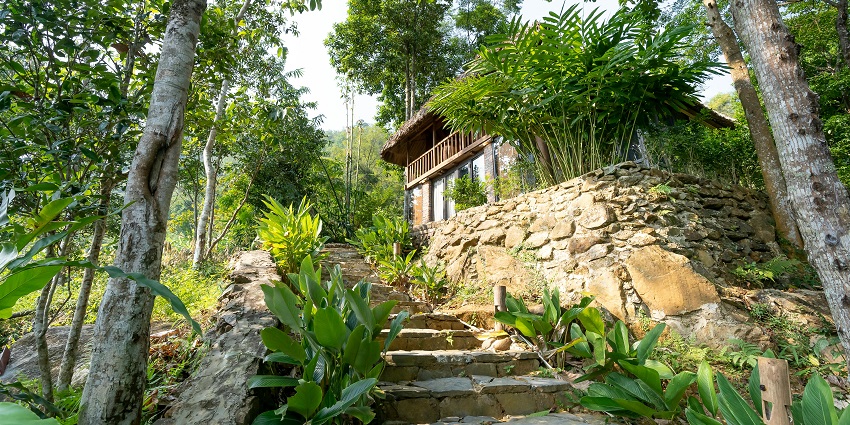
Photo: Quang Nguyen Vinh / Pexels / Image For Representation Only
Accommodation options surrounding Shikari Devi Wildlife Sanctuary mainly comprise budget guesthouses and mid-range hotels. In Mandi, staying facilities include some comfortable hotels like Hotel Rajhans and Hotel River View with all the modern facilities and rooms attached with quality views. In and around the sanctuary, eco-friendly lodges and homestays also exist to experience an authentic holiday closer to nature.
Where To Eat Around Shikari Devi Wildlife Sanctuary

Photo: Pixabay / Pexels / Image For Representation Only
The food outlets in and around Shikari Devi Wildlife Sanctuary would fulfil all tastes. Local Himachali dishes are available in restaurants at Mandi, and significant dishes include Chana Madra and Siddu. From local dhabas to more elan-type restaurants, the various types of food available range from Indian, Tibetan to even Continental. For those seeking a more authentic experience, local dhabas (small roadside eateries) offer hearty, home-style meals that showcase the rich flavours of Himachali cuisine. These dhabas are perfect for a quick, satisfying meal after a day of exploring the sanctuary.
Suggested Read: Trekking In Great Himalayan National Park
Best Time To Visit
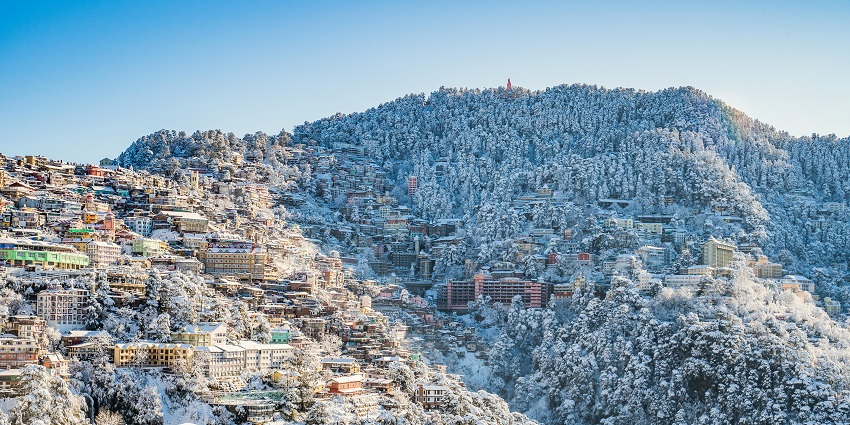
Photo: shalender kumar / Pexels / Image For Representation Only
The best months to visit Shikari Devi Wildlife Sanctuary are March through June and September through November when the weather is more accommodating and allows visitors to explore the area and see wildlife easily. Summertime brings cool temperatures together with a clean, green sky after the monsoon: Winter temperatures can drop significantly, and monsoons can make the area impassable and impair animal visibility. Therefore, to fully enjoy the beauty and biodiversity of Shikari Devi Wildlife Sanctuary, it is best to plan your visit during the more temperate and dry seasons of spring, early summer, and autumn.
Other Factors To Consider
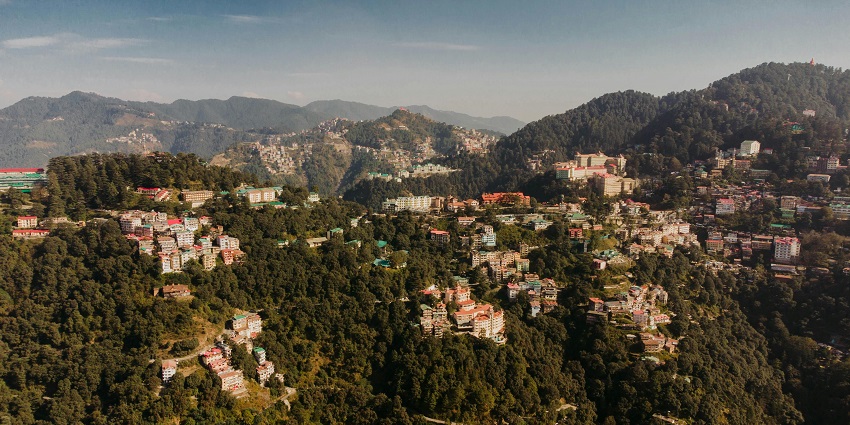
Photo: Mohit Hambiria / Pexels / Image For Representation Only
Average Cost Of The Trip:
For budget travellers, daily expenses, including accommodation, food, and local transportation, should be between INR 2,500 and 4,000. Midrange budgets may range from INR 5,000 to 7,000 per day, while luxury experiences could exceed ₹10,000 daily, covering upscale accommodations (₹6,000–10,000), gourmet dining (₹2,000–4,000), and private transport (₹3,000–5,000). Entry fees for the sanctuary are typically between ₹100 and ₹300 per person.
Tips For Travellers:
- Book accommodation in advance, especially during peak seasons.
- Bring warm clothing, as temperatures can drop significantly at higher altitudes.
- Respect local wildlife and follow sanctuary guidelines for a safe visit.
- Carry sufficient cash, as ATMs and card payment facilities may be limited in remote areas.
- If camping, ensure you have the necessary gear and are prepared for varying weather conditions.
- Engage with the local community and enjoy regional food to enhance your travel experience.
Suggested Read: Wildlife Sanctuaries In Himachal Pradesh To Visit On Your Upcoming Trip
The Shikari Devi Wildlife Sanctuary, renowned for its natural beauty and biodiversity, offers a peaceful escape and a chance to explore the wonders of Himachal Pradesh’s wildlife. Whether you are a nature lover or seeking spiritual solace, the sanctuary promises a memorable experience amidst stunning natural surroundings. Embark on your next adventure with TripXL and discover this breathtaking destination, creating unforgettable memories.
Cover Photo: Sunil Sharma / Wikimedia Commons


 WhatsApp
WhatsApp
 Twitter
Twitter









